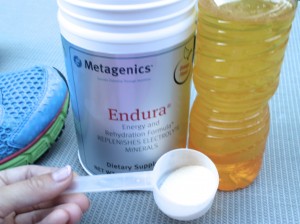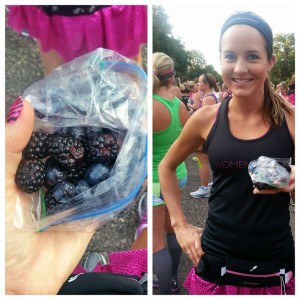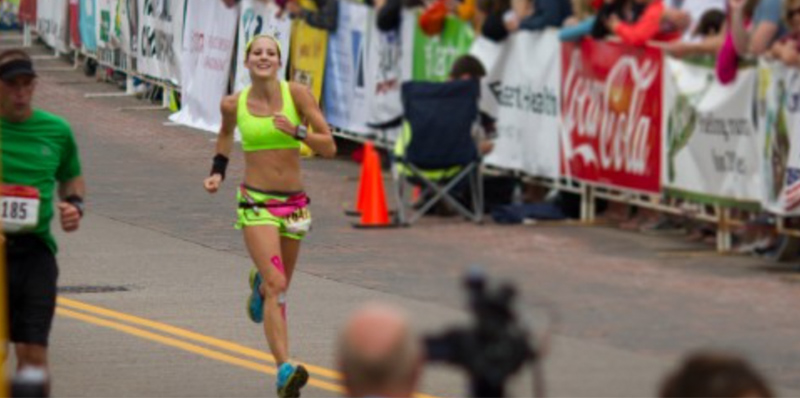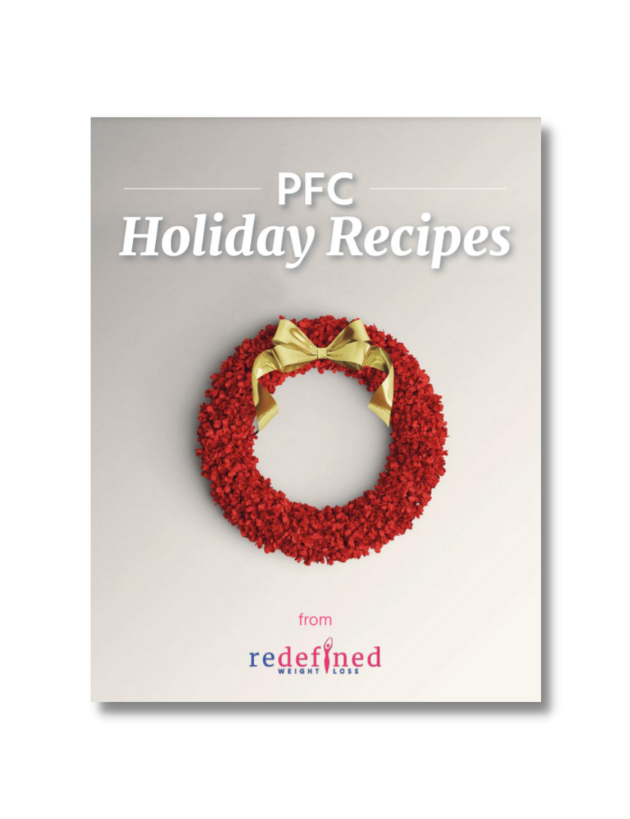Nutrition will make or break your training and your race. Many of my clients who are runners came to me with the dilemma that their performance is great, but they know they could be better if they ate right. It’s crucial to be both well trained AND well fueled for maximum performance. Some sports dietitians may tell you to calculate specific amounts of carbohydrates or calories per kg of body weight, but this isn’t my style. In the same sense I’m not the kind of dietitian who will tell you to count calories, points or grams of fat either. I am an advocate of being in touch with your body and establishing the type of relationship where it doesn’t require you to count things, but encourages you to be in tune with what your body is telling you. My approach to nutrition for running is in sync with my approach to overall wellness: REAL FOOD. Therefore, similar to my general nutrition advice, it may be different from the conventional nutritional advice you’re used to hearing.
Being a Registered Dietitian and marathon runner, I’ve wanted to write this post for quite some time, but knew I was putting it off and couldn’t figure out why. When I really thought about it, I realized I was putting it off for one reason: Different approaches work for different people. In this post I intend to provide you with what I’ve found works best for my marathon running and for several of my clients as well. Something different may work for you, and that’s okay! As with anything nutrition-related, there are several different (and often times, conflicting) approaches. Over the past several years, I’ve read books and articles about nutrition for running and attended more seminars on this topic than I’d like to admit. The thing that bothers me most is the one-size-fits-all approach. One thing I’ve learned through being a runner and coaching other runners is that the same fueling strategy which works great for one runner, can also be the approach which has the opposite effect on someone else. This may include the runner hitting a wall sooner rather than later, or even worse — experiencing the dreaded “Runner’s Trots.” Keep in mind that although my recommendations may work for you, they also may not, and the best time to find out is during your training — NOT during your race. With my clients who are runners, whether they are training for their very first 5K race or hoping to PR their next Ultra Marathon, it can take a while to figure out what fueling strategies works best. Sometimes we have to adjust their nutrition regimen a FEW times in order to find just what works for their body and what will get them on the quickest track to reach their goals. The key is to be patient and listen to your body.
My Top 10 Nutrition for Running Tips:
1) Eat protein and fat too — not just carbs! Carbo-loading is the ubiquitous strategy used by endurance athletes for prolonged energy during their runs. Hand in hand with carbo-loading you’ll usually find massive pasta dinners. Runners can certainly benefit from consuming an adequate amount of carbohydrates, but it’s also important to also eat protein and fat. Although carbohydrates are burned for energy, protein and fat are the two macronutrients that have more power to hold you over. Strive to maintain a balance of protein, fat and carbohydrates (PFC!) at your pre and post run meals. It’s okay to load up on carbs, just make sure you load up on fat and protein too! My favorite pre-race evening meal is 4-5 ounces of tilapia or salmon (protein), cooked in olive oil and topped with sliced avocado (healthy fats) with a sweet potato and a giant salad (carbohydrates). My favorite post-run meal is eggs (protein), cooked in butter (healthy fat) with cooked spinach and banana on the side (carbohydrates).

2) Steer clear of artificial sweeteners and sugar alcohols. Ever experienced gastrointestinal issues or had troubles with “Runner’s Trots?” Artificial sweeteners and sugar alcohols can cause extreme irritation to the gut, even hours after consuming them because the body does a poor job processing them. Beware, as they are found in many popular running fuels (Endura is my fuel of choice). Also, if you are experiencing constant GI issues during your runs or if you have used products with sugar alcohols and artificial sweeteners in the past, then you may greatly benefit from taking daily probiotic and glutamine supplements to support gut integrity. This strategy alone has worked wonders for many of my clients who are runners.
3) Consider going grain-free or entirely gluten free. This is counterintuitive to mainstream nutrition for running advice, but many of my clients feel better and run better when they swap out processed carbs like bread and pasta for nutrient dense ones like veggies and fruits. That being said, I have a handful of runners who say they actually run better when they do include some grains, so again: listen to your body.
4) Don’t try anything new on race day. This is a popular piece of advice, and for good reason. Find what works and doesn’t work for your body during your training – not during your race. Usually when I hear stories from runners who don’t race well, it’s because they did something they hadn’t done in their training; skipping breakfast, over-hydrating with sports drinks, not stopping to use the restroom or trying an energy gel for the first time. I can’t emphasize enough the importance of training just how you plan to race and racing exactly how you train.
 5) Pre-run Fueling: You need to be the most careful and attentive to your body when fueling before your run. Some runners can chow down until the second they hit the pavement, but others need to let their food digest and stomachs settle first. How much you should eat before a run depends on your distance, your personal tolerance and the timing of your run. For me, if I’m going for a short run first thing in the morning, I might have half a banana or half a LARABAR before venturing out. If it’s a “Long Run Saturday” and I can wait an hour or two after waking to start running, then I make it balanced and include all three macronutrients (Protein, Fat and Carbs = PFC) with a couple of eggs and half a sweet potato sautéed in butter. Some people can’t handle having a lot of fat before they run, because fat takes longer to digest. Again, the key is to know yourself and experiment with what your body can handle during your training.
5) Pre-run Fueling: You need to be the most careful and attentive to your body when fueling before your run. Some runners can chow down until the second they hit the pavement, but others need to let their food digest and stomachs settle first. How much you should eat before a run depends on your distance, your personal tolerance and the timing of your run. For me, if I’m going for a short run first thing in the morning, I might have half a banana or half a LARABAR before venturing out. If it’s a “Long Run Saturday” and I can wait an hour or two after waking to start running, then I make it balanced and include all three macronutrients (Protein, Fat and Carbs = PFC) with a couple of eggs and half a sweet potato sautéed in butter. Some people can’t handle having a lot of fat before they run, because fat takes longer to digest. Again, the key is to know yourself and experiment with what your body can handle during your training.
6) Post-run Fueling: After your run, you want to wait about 30 minutes before you eat to let your body get out of “fight or flight mode,” and into a more relaxed state so it can digest your refuel food. I recommend a  full, balanced meal consisting of protein to aid in muscle recovery, healthy fat to support your joints and carbohydrates to replenish the ones you burned for energy. This meal doesn’t need to be anything special; it just needs to contain all three macronutrients (PFC.) Examples of PFC balanced meals include: eggs and spinach cooked in butter, a chicken breast served over a big salad with olives and feta cheese or a filet of fish broiled in butter with cooked vegetables.
full, balanced meal consisting of protein to aid in muscle recovery, healthy fat to support your joints and carbohydrates to replenish the ones you burned for energy. This meal doesn’t need to be anything special; it just needs to contain all three macronutrients (PFC.) Examples of PFC balanced meals include: eggs and spinach cooked in butter, a chicken breast served over a big salad with olives and feta cheese or a filet of fish broiled in butter with cooked vegetables.
7) Be open minded. Two years ago I wrote an article for RunAddicts called How Carboloading Can Improve Your Running. In this article, I mention that complex carbohydrates including brown rice, bread, oatmeal, vegetables and milk are most effective. I no longer believe this to be true and I no longer consider any of this list except for vegetables to be REAL food. This is a PRIME example of how important it is to stay open-minded, and allow your views to evolve over time as you learn and grow. I would no longer eat bread or pasta before a run and haven’t done so since my first marathon in October 2011 (shortly after I wrote the carbo-loading article). In that same article I provided guidelines for recommended calories from carbohydrates — another concept I no longer believe in and am actually OPPOSED to (see recent blog post series: I HATE CALORIES: PART 1 AND PART 2). These days, I listen to my body, and eat more balanced than I did in my true carbo-loading days.
8) Eat PLENTY of healthy fats. I may have mentioned this once or twice already, but it’s worth repeating. Runners NEED fat to to lubricate and protect their joints and organs, to aid in recovery, help their body with temperature control and the absorption of nutrients, and to keep their body fueled and appetites satisfied. Please hear me out: low-fat diets for runners are SO damaging. Make the vow today to stop depriving your body of a macronutrient that it so essentially needs. Make sure to include nuts, seeds, avocado and real butter in your daily intake. You won’t regret it.
9) Hydrate before you’re thirsty but don’t overdo it. Determine your sweat rate by weighing yourself before and after your run. For every pound you lose, you need approximately 16 ounces of water.
10) Take your vitamins. Runners have higher demands for nutrient needs. EVERY runner can benefit from key supplements to support joints and cartilage, to aid in injury prevention, and for optimal performance. You can check out the supplements I recommended for runners here.
Now, if you’re like me, you get crazy sugar cravings….especially on run days. Conquer those cravings with this amazing step by step guide! In the free download, finally grab your freedom from sugar!












How do you personally go about maxing out glycogen stores before a marathon? And during the race? It seems hard to avoid the carbohydrate bombs such as gels and chews, but I have read of marathoners/ultramarathoners teaching their body to run mostly on fat from nut butters and the like.
As a vegan, I’ve started using dates on my long runs to replace those gels. I have a hydration belt where I stripped off the water bottles and just use the zip pockets. I pit the dates and place them in a snack sized ziploc. It has worked wonders so far.
This is me, I’ve spent so many years playing with carb loading in various forms and have finally taken the decision to remove grains from my diet. I feel so much better and my running has improved, exercise induced asthma is improving and all in a week. I agree wholeheartedly with this article and will be recommending it to my clients